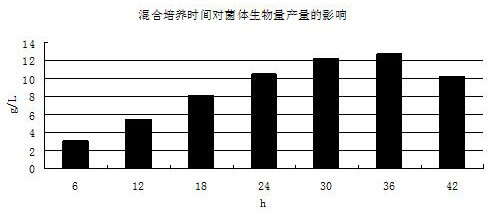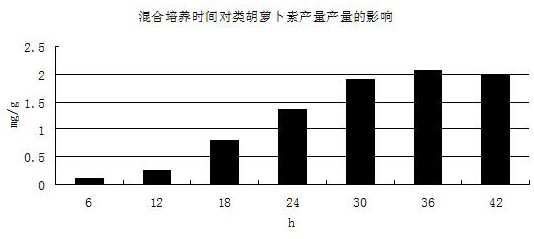A method of producing carotenoids
A carotene and compound microorganism technology, which is applied in the field of carotenoid production to achieve the effects of reducing enterprise costs, low raw materials and reducing usage
- Summary
- Abstract
- Description
- Claims
- Application Information
AI Technical Summary
Problems solved by technology
Method used
Image
Examples
Embodiment 1
[0039] A method for producing carotenoids, comprising the steps of:
[0040] Centrifuge the composite microbial culture at 8000rpm and 4°C for 20min, discard the supernatant, collect the bacteria, then add acetone according to the amount of 1kg bacteria: 1L acetone, and then ultrasonically break the wall, the ultrasonic power is 300W, and the time for each ultrasonic The time is 10s, the interval time is 10s, the total ultrasonic time is 30min, then stand still for 30min, then centrifuge at 5000rpm for 5min, collect the supernatant and precipitate, add the same volume of acetone to the precipitate, use ultrasonic treatment for 15min, ultrasonic power is 300W, Each ultrasonic time is 10s, the interval time is 10s, then centrifuged at 5000rpm for 3min, and the supernatant is collected; the two supernatants are combined, and then evaporated to dryness with a rotary evaporator at low temperature, the residue is dissolved with twice the weight of ether, and then added A 30% KOH met...
Embodiment 2
[0049] A method for producing carotenoids, comprising the steps of:
[0050] Centrifuge the complex microbial culture at 8000rpm and 4°C for 20min, discard the supernatant, collect the bacteria, then add acetone according to the amount of 1kg bacteria: 1.5L acetone, and then ultrasonically break the wall, the ultrasonic power is 300W, each ultrasonic The time is 10s, the interval time is 10s, the total ultrasonic time is 30min, then stand still for 30min, then centrifuge at 5000rpm for 5min, collect the supernatant and precipitate, add the same volume of acetone to the precipitate, use ultrasonic treatment for 15min, and the ultrasonic power is 300W , each ultrasonic time is 10s, the interval time is 10s, then centrifuged at 5000rpm for 3min, and the supernatant is collected; the two supernatants are combined, and then evaporated to dryness with a rotary evaporator at low temperature, the residue is dissolved in ether, and then add 6 / 6 A volume of KOH methanol solution with a ...
Embodiment 3
[0059] The changes in the main components of rice straw caused by blasting are shown in Table 1:
[0060] Table 1
[0061] index Before blasting after blasting Hemicellulose and Cellulose% 53.7 40.5 Lignin % 27.9 22.1 Xylooligosaccharide% 0 3.4
[0062] Conclusion: Blasting caused the cell wall of straw to be destroyed, and some hemicellulose and cellulose were degraded and dissolved, which was beneficial to the subsequent enzymatic hydrolysis of cellulose by cellulase; the crystallinity and polymerization degree of cellulose decreased during the blasting pretreatment process, and hemicellulose passed It is degraded into monosaccharides and oligosaccharides by hydrolysis, which can be used as a carbon source for the strain.
PUM
 Login to View More
Login to View More Abstract
Description
Claims
Application Information
 Login to View More
Login to View More - R&D
- Intellectual Property
- Life Sciences
- Materials
- Tech Scout
- Unparalleled Data Quality
- Higher Quality Content
- 60% Fewer Hallucinations
Browse by: Latest US Patents, China's latest patents, Technical Efficacy Thesaurus, Application Domain, Technology Topic, Popular Technical Reports.
© 2025 PatSnap. All rights reserved.Legal|Privacy policy|Modern Slavery Act Transparency Statement|Sitemap|About US| Contact US: help@patsnap.com


